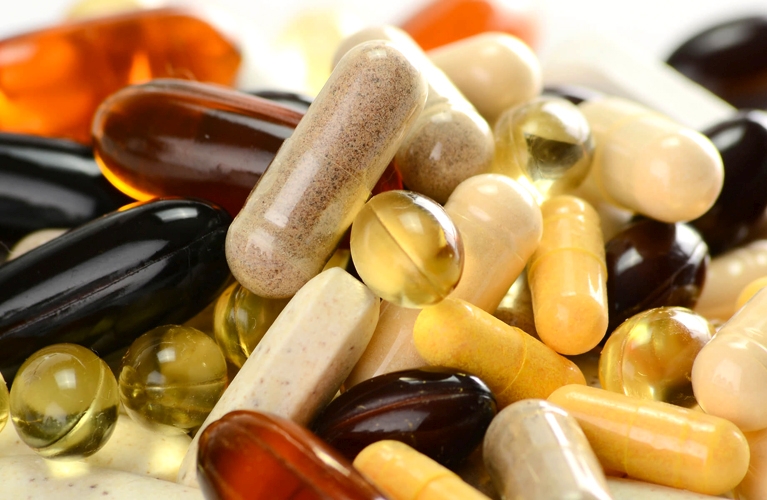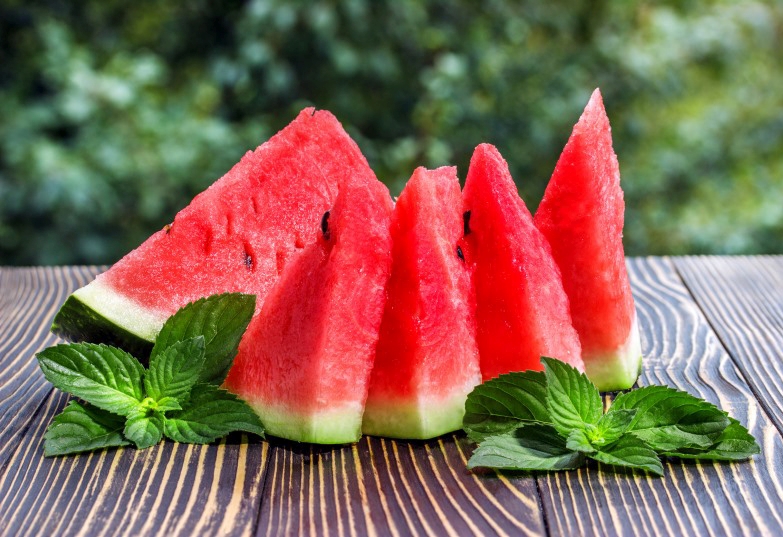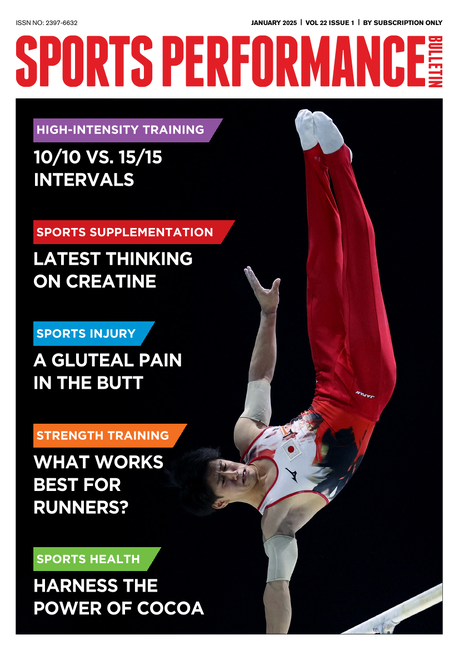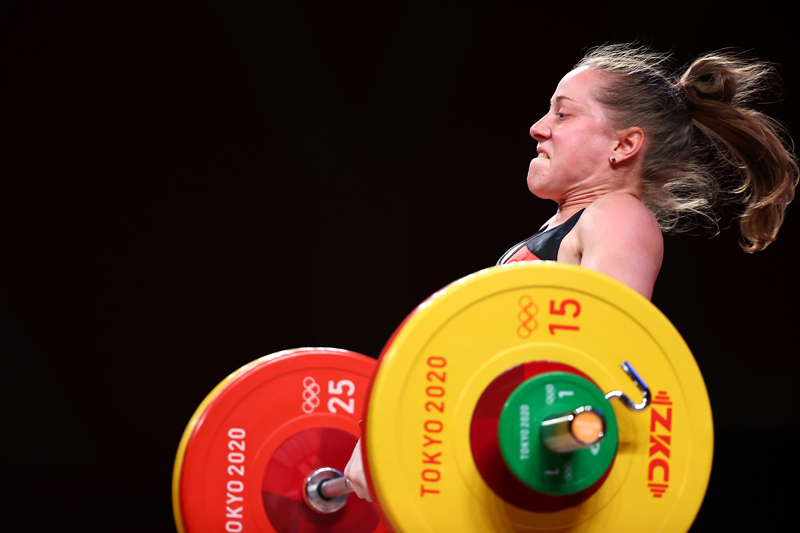You are viewing 1 of your 1 free articles. For unlimited access take a risk-free trial
Bovine colostrum and performance: where’s the beef?
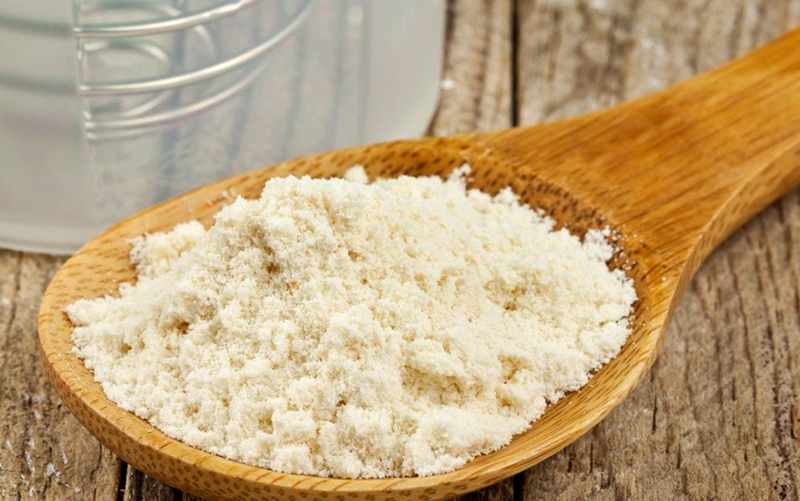
Regular readers will be aware that Sports Performance Bulletin takes a very measured view on sports supplementation; although there are a few supplements such as carbohydrate, caffeine and creatine, which are supported by solid scientific evidence, many more aren’t. Indeed, browsing some of the online sports supplement websites, the phrase ‘lies, damn lies and supplements’ often springs to mind!
However, this doesn’t mean that we should reject all supplements where there is not yet overwhelming evidence. In some instances, the research may be very promising but is limited in its extent simply because the supplement in question has only recently come under scrutiny. Likewise, some supplements that have been previously been rejected for some aspects of performance – for example aerobic power - can once again look promising at a later time when investigated for other aspects of performance, such as supporting immune function. Bovine colostrum very much falls in the latter category, and in this article we’ll explore what it is, and how and when it might help endurance performance.
What is bovine colostrum?
Colostrum, sometimes also called ‘first milk’, is the first form of mother’s milk that newborn mammals receive from their mother after birth. Colostrum is produced in the mammary glands of females just prior to giving birth, and is a mammary-derived protein source that is highly enriched in growth factors and specific proteins that promote development and improve immunity in newborns. In particular, it is a concentrated source of proteins, growth factors, and antibodies that are essential for early development of newborns. In contrast to other dairy proteins such as whey, colostrum is highly enriched with specific growth factors thought to promote rapid growth and development of offspring, such as immune-enhancing immunoglobulins and other antimicrobial agents. While it’s true that these components are also found in whey, the concentration in colostrum is far higher. For example, immunoglobulins (a subset of dietary protein which are known to support immune function) are typically present at concentrations of around 20150 grams per litre in bovine colostrum (depending on vaccine administration and immune status of the cow)Curr Pharm Des. 2007;13(8):829-43. This compares with just 0.5-1.0 grams per litre in ordinary bovine (cow’s) milk (see figure 1).FIGURE 1: COLOSTRUM VS. MILK
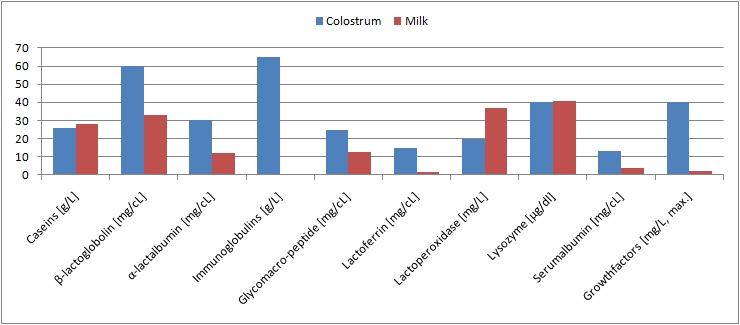
Note that while levels of the chief protein constituent (casein) are broadly similar, the levels of immune-supporting immunoglobulins and growth factors are far higher in colostrum.
The precise composition of colostrum varies significantly, both over the course of the lactating period as well as in response to factors affecting the mother such as immunisation and antibody production. However, all colostrum contains dietary proteins including whey and casein, carbohydrate in the form of lactose, dietary fatty acids, and a large amounts of immunoglobulins (a subset of dietary proteins, and which are thought to be the main bioactive components). This immunoglobulin content is typically comprised of around 70-75% IgG1 followed by IgM, IgA, and IgG2 in descending concentrationsBr J Nutr. 2000 Nov;84 Suppl 1:S75-80. Figure 2 shows a typical breakdown of the constituents of bovine colostrum.
FIGURE 2: TYPICAL CONCENTRATIONS OF COMPONENTS OF BOVINE COLOSTRUM
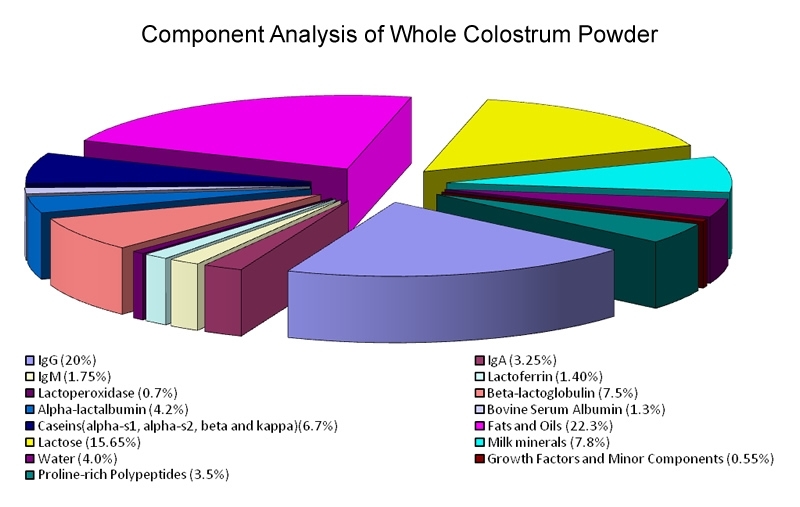
Bovine benefits
Before we go on to look at the recent evidence for bovine colostrum supplementation, let’s quickly review the claims made for it – both in terms of aiding athletic performance and promoting general health.- GUT HEALTH - the gut is responsible for nutrient absorption, detoxification and supporting immune function. The major player here is a special immunoglobulin protein called secretory IgA (sIgA); individuals with chronic gut problems, such as irritable bowel syndrome Crohn’s disease, ulcerative colitis etc typically have low levels of sIgA. Colostrum contains very high levels of sIgA, and supplemeting it therefore could top up slgA and provide a balancing effect on the immune system by reducing inflammatory and pathogenic species in the gut. Moreover, colostrum also helps provide raw materials to help repair a damaged gut lining. The intestinal membrane replaces cells every three days, and colostrum supplementation can help heal intestinal problems such as leaky gut syndrome and other permeability issues naturally.
- IMMUNITY - colostrum provides over 100 times the amount of immunoglobulins as regular milk. It is also rich in factors that ‘educate’ and ‘modulate’ the immune system and successfully teach it to recognise specific antigens (threats). These transfer factors also help coordinate the immune system to be able to recognise the difference between normal tissue and pathological microbes or abnormal tissue growth. This improves the intelligence of the immune system and allows it to function with greater efficiency. In theory therefore, consuming colostrum should help with immune function.
- ATHLETIC PERFORMANCE – With high levels of growth factors, immune-supporting proteins, vitamins and minerals, and high-quality proteins, bovine colostrum has not only been researched for its potential health-giving properties, but for the possible benefits on athletic performance too. In particular because the gut plays a key role in modulating the function of a number of hormones (the body’s chemical messengers) involved in a range of processes during digestion and metabolism, there’s been speculation that supplementing with bovine colostrum could aid carbohydrate metabolism, protein turnover, and in turn, recovery after exercise.
BOX 1: LOW MOLECULAR-WEIGHT BOVINE FRACTION
The most investigated bioactive protein in colostrum, is known as insulin-like growth factor (IGF-1), which is present at high concentrations. Unfortunately however, IGF-1 does not appear to be well absorbed from the adult intestinal tract, and is instead digested (broken down) into inactive protein fragments called peptides.With this in mind, some studies have used a colostrum low molecular weight fraction (CLMWF) that is produced via ultra-filtration membrane. This process filters out higher molecular weight immunoglobulins and macronutrients that are too large to pass through the filter, creating a concentrated liquid that is enriched in lower molecular weight vitamins, minerals, peptides and growth factors.
These proteins are much more likely to be absorbed intact through the gut, which in theory should enhance immunity. Studies support this approach; oral supplementation with 150mg per day of CLMWF has been reported to activate innate immune activity, suggesting that this low-molecular weight colostrum fraction may have significant biological activityPrev Med. 2012 May;54 Suppl:S124-9.
Colostrum and athletic performance
Over the years, a number of studies have been undertaken into the effect of bovine colostrum supplementation on athletic performance. Research is still ongoing but it has to be said that when researchers have looked for a direct and immediate effect on parameters such as aerobic power, anaerobic power, muscular endurance, strength and muscle growth etc, the results have been inconclusive. Yes, it’s true that some studies have found benefits – particularly in terms of muscle function. However, most studies have reported no additional benefits over and above that provided by normal whey protein. In other words, the benefits that were noted seemed to be conferred by the whey protein in colostrum – not the components that uniquely are concentrated in bovine colostrum, such as immunoglobulins and growth factors. Table 1 provides an overview of some of the key studies into bovine colostrum and athletic performance.TABLE 1: SUMMARY OF STUDIES INTO BOVINE COLOSTRUM SUPPLEMENTATION AND PERFORMANCEAppl Physiol Nutr Metab. 2014 Sep;39(9):1070-82
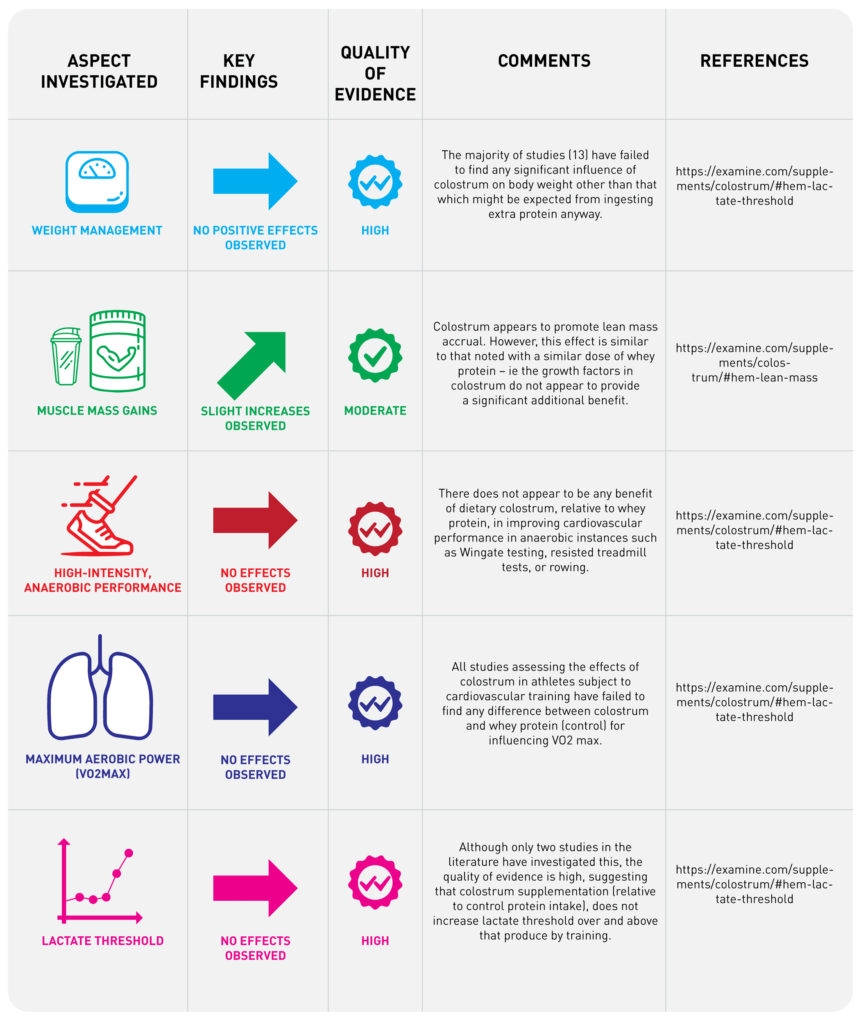
Where’s the beef?
At this point, you might be tempted to dismiss the thought of bovine colostrum supplementation completely. However, quite recent research suggests that for some athletes in some circumstances, bovine colostrum could provide real benefits for those engaged in hard training. One reason for this is that taken as a supplement, bovine colostrum appears to attenuate the increase in gut permeability that occurs during intense exercise.Several factors can harm the integrity of the intestinal barrier. These include prolonged strenuous exercise, heat stress, and drugs such as nonsteroidal anti-inflammatory agents. Loss of intestinal barrier integrity leading to increased intestinal permeability may result in passage of toxins into the bloodstream. This in turn can result in an inflammatory cascade, further exacerbating the loss of barrier function and, in severe cases, resulting or exacerbating conditions such as exertional heat stroke, associated with hyperthermia, multi-organ failure, and endotoxemiaAm J Physiol. 1 March 2011 Vol. 300 no. 3, G477-G484.
However, a similar but less severe process can also occur during exercise, which has relevance for many athletes involved in heavy exercise such as long-distance running. This loss of instestinal integrity (as a result of increased gut permeability) can lead to gastrointestinal symptoms such as cramps, diarrhea, nausea, and bleeding, which are commonly reported by long-distance runnersJ Appl Physiol 82: 571–576, 1997. These symptoms are likely to be due to a combination of reduced gut blood flow, hormonal changes, altered gut permeability, and increased body temperature.
Gut permeability
A 2011 study by British researchers, found compelling evidence for the potential benefits of consuming bovine colostrumAm J Physiol Liver Physiol 2011. 300: G477-G484. In a double-blind, placebo-controlled, crossover study (the most rigorous kind of scientific study), twelve volunteers (runners and rugby players) completed a standardised exercise challenge, consisting of running uphill on a treadmill at 80% of VO2max (hard) for 20 minutes.For 14 days before the exercise challenge, the subjects took either 20 grams per day of bovine colostrum or an inert placebo – but one that provided the same number of calories and overall levels of protein/ carbohydrate. Immediately after the exercise trial, measures of gut permeability were taken from all the subjects. After a twoweek ‘washout’ period, the whole procedure was repeated but this time reversed (crossover) - ie those who had taken the placebo now took colostrum and vice versa.
The key finding was that when the subjects took the placebo, their gut permeability increased 2.5-fold. However, when they had been consuming colostrum, this rise in permeability was reduced by 80% (see figure 3). The researchers concluded that ‘colostrum may have value in enhancing athletic performance and possibly preventing heat stroke’.
FIGURE 3: GUT PERMEABILITY FOLLOWING INTENSE EXERCISEAm J Physiol Liver Physiol 2011. 300: G477-G484
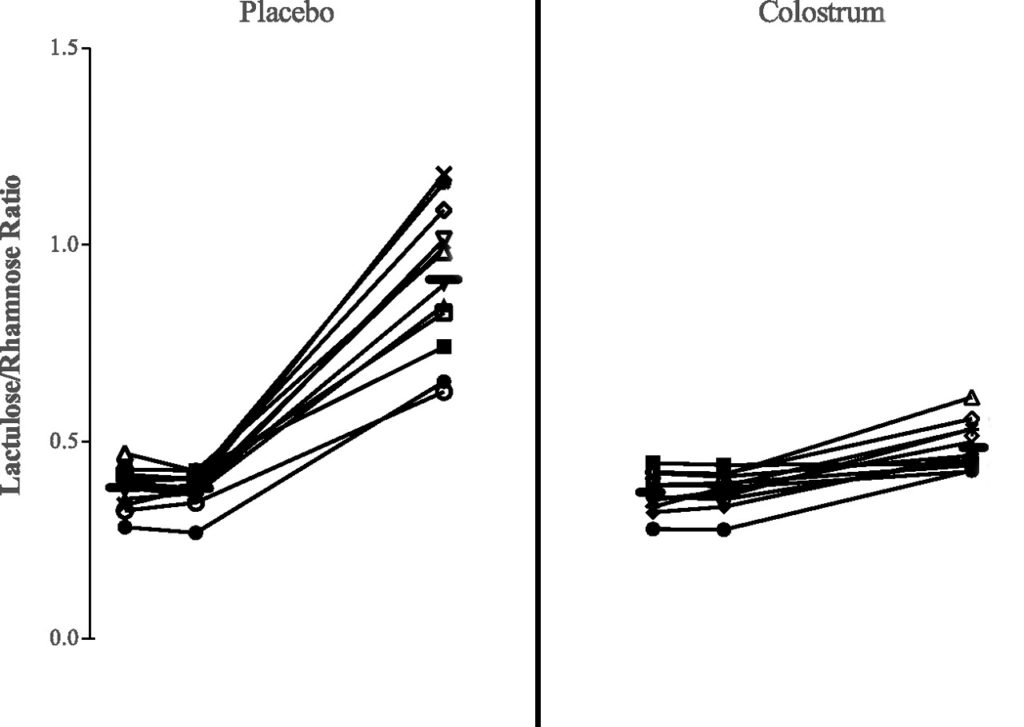
Further evidence
There’s further evidence for the ability of bovine colostrum to decrease gut permeability. In a study published just four months ago, researchers assessed effect of colostrum supplementation on intestinal permeability in a group of 16 athletes during peak training for competitionNutrients. 2017 Apr 8;9(4). pii: E370. This was another double-blind, placebo-controlled study, which compared supplementation for 20 days with bovine colostrum or placebo (whey protein). However, there was no exercise challenge in this study; the subjects simply carried on with their normal training.The baseline tests for gut permeability found that 75% of the participants in the colostrum group had increased intestinal permeability. After bovine colostrum supplementation, their permeability values were significantly lower than at baseline, and within the normal range. This compared to when the subjects took the placebo, where there were no significant reductions in permeability. The researchers concluded that ‘colostrum supplementation is safe, and an effective method of decreasing intestinal permeability in athletes at increased risk of its elevation.
Yet another very recent study suggests that bovine colostrum can reduce gut permeabilityAm J Clin Nutr. 2016 Aug;104(2):526-36. Eight subjects completed a double-blind, placebo-controlled crossover study. In this study however, the researchers also looked at the combination of colostrum and another nutrient called zinc carnosine. In a 4-stage study, the subjects underwent four separate two-week blocks of supplementation, which consisted of the following:
- Placebo
- Bovine colostrum alone
- Zinc carnosine alone
- Bovine colostrum and zinc carnosine combination
Not every study has found that bovine colostrum decreases gut permeability in athletes. In a 2014 study on seven trained and eight untrained subjects who undertook an exercise challenge after 7 days of colostrum supplementation, there were no performance gains or reductions in gut permeabilityAppl Physiol Nutr Metab. 2014 Sep;39(9):1070-82. The researchers concluded that ‘bovine colostrum supplementation had no observable benefit on the physiology or performance of either highly trained endurance athletes or untrained individuals’.
These results are at odds with the current scientific consensus but why? One possibility is that the seven-day period of supplementation was not long enough to produce a significant benefit (most studies have used 14 days). Another is that the bovine colostrum supplement used may have contained low levels of absorbable active ingredients. If you remember from earlier, active ingredients such immnunoglobulins are easily broken down in the stomach unless they are of the low molecular weight type, which means they become inactive. Also, bovine colostrum products are heat-treated during production (for safety). However, if this is carried out incorrectly, it can deactivate the active components, leaving a product that’s little different from standard whey protein.
BOVINE COLOSTRUM AND IMMUNITY
Before we conclude, it’s worth mentioning some other recent research on bovine colostrum supplementation for athletes.As most athletes know, training hard brings with it the risk of illness and infection, especially upper respiratory tract infections such as coughs, colds and sore throats etc. And when that happens, athletes are forced to take time off, which is obviously very undesirable.
While there’s evidence that bovine colostrum can help support immunity in the general population, the data on immunity in athletes and those undergoing heavy exercise is much more limited. However, a recent study published just last year by British scientists has reviewed all the previous studies in this areaBMC Sports Sci Med Rehabil. 2016 Jul 26;8:21. In the study, researchers pooled the data from five trials with 152 participants, all of whom were involved in regular exercise training. When the results were pooled and analysed, they indicated that (compared to placebo) bovine colostrum supplementation significantly reduced the number of days where athletes suffered upper respiratory tract infections during an 8-12 week follow-up period.
Another study looked at immunity in competitive cyclists supplementing with colostrumJ Sports Med Phys Fitness. 2013 Oct;53(5):490-501. It looked at levels of an immune marker known as salivary IgA (which as it name suggests is found in saliva) following a 5-day cycling race after an 8-week period of either bovine colostrum or placebo supplementation. Although there were no differences in levels of IgA, the researchers had also measured levels of the hormone testosterone, and the cyclists’ heart rate variability (HRV).
What they observed was that the colostrum-supplemented cyclists did not suffer a reduction in HRV during the race (reduced HRV indicates an increase in physiological fatigue). Also, levels of testosterone in the bovine-supplemented cyclists were maintained, whereas they fell in the placebo group. A reduction in testosterone levels is common in athletes who undergo hard training with poor recovery. The researchers concluded that their results should prompt further research on the effects of bovine colostrum for recovery in endurance athletes.
PRACTICAL ADVICE
HOW MUCH?
Most studies in this area have used around 20 grams per day of bovine colostrum. The optimal amount may be more or less, but until evidence is published to the contrary, this is the amount that would be recommended. However, in products containing higher and standardised levels of key components such as active IgG, less may be needed.HOW LONG?
All of the studies with positive findings have used two weeks or more of supplementation. Taking colostrum for shorter periods may be of little benefit. It’s possible that longer periods of supplementation may give cumulative benefits; in the study on recovery, HRV and testosterone, subjects took colostrum for an 8-week period – however, more research is needed.HOW TO CHOOSE?
There are a number of colostrum products on the market and it can be hard to choose. The key is to ensure the product you choose is both safe AND effective. Here are some pointers:- Colostrum must be sourced from veterinarian certified healthy, BST, BSE and antibiotic free Grade A, pasture fed, pesticide free dairy cows, where cows give birth year round so that the colostrum is as fresh as possible.
- Colostrum should only be taken from the first milking (within 16 hours) after birth.
- All colostrum products should be flash pasteurised to ensure they meet food safety regulations and to destroy any possible contaminating bacteria that might be present. Processing should take place in low indirect steam drying to ensure its components are not denatured (destroyed).
- Colostrum should be tested (after processing) to ensure that all of its components are intact and bioactive, and have not been denatured by the drying and pasteurisation processes. Ideally, colostrum needs to be standardised to minimum component contents, so that you can be assured that its components are present and biologically available.
- Colostrum should come from manufacturers that are licensed to produce dairy food for human consumption. Additionally, it should be manufactured in a plant designed specifically to produce bovine colostrum for human consumption.
- Whole colostrum is preferred to de-fatted colostrum, which may be more prone to breakdown in the stomach.
Newsletter Sign Up
Testimonials
Dr. Alexandra Fandetti-Robin, Back & Body Chiropractic
Elspeth Cowell MSCh DpodM SRCh HCPC reg
William Hunter, Nuffield Health
Newsletter Sign Up
Coaches Testimonials
Dr. Alexandra Fandetti-Robin, Back & Body Chiropractic
Elspeth Cowell MSCh DpodM SRCh HCPC reg
William Hunter, Nuffield Health
Keep up with latest sports science research and apply it to maximize performance
Today you have the chance to join a group of athletes, and sports coaches/trainers who all have something special in common...
They use the latest research to improve performance for themselves and their clients - both athletes and sports teams - with help from global specialists in the fields of sports science, sports medicine and sports psychology.
They do this by reading Sports Performance Bulletin, an easy-to-digest but serious-minded journal dedicated to high performance sports. SPB offers a wealth of information and insight into the latest research, in an easily-accessible and understood format, along with a wealth of practical recommendations.
*includes 3 coaching manuals
Get Inspired
All the latest techniques and approaches
Sports Performance Bulletin helps dedicated endurance athletes improve their performance. Sense-checking the latest sports science research, and sourcing evidence and case studies to support findings, Sports Performance Bulletin turns proven insights into easily digestible practical advice. Supporting athletes, coaches and professionals who wish to ensure their guidance and programmes are kept right up to date and based on credible science.
